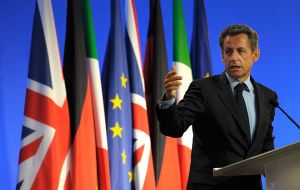MercoPress. South Atlantic News Agency
G8 promises aid in support of ‘Arab spring’ and democratic consolidation
 French president Nicholas Sarkozy chairs the G8 meeting in Deauville (Photo Reuters)
French president Nicholas Sarkozy chairs the G8 meeting in Deauville (Photo Reuters) The Group of Eight leaders meeting in France are expected to approve on Friday billions of dollars in aid in support of the ‘Arab spring’ with a program designed to foster change sweeping North Africa and the Middle East.
Leaders were to wrap up their two-day summit in northern France by launching a partnership with the region that ties aid and development cash to progress on democracy and economic reforms by states that have thrown off autocratic rulers.
Tunisia and Egypt Prime Ministers are scheduled to meet leaders of the G8's seven Western powers plus Russia on Friday. Both countries face huge economic pressures following popular uprisings that toppled their long-serving authoritarian leaders.
In a report to G8 leaders the IMF said on Thursday the external financing needs of oil-importing countries in the Middle East and North Africa would top 160 billion USD over the next three years.
“The region needs to prepare for a fundamental transformation of its economic model,” Masood Ahmed, in charge of Middle East and Africa at the IMF, told journalists on the sidelines of the G8 meeting in Deauville, Normandy.
“This will be greatly facilitated if international players including the G8 can enter into strategic partnership with these countries ... where incentives are linked to a social agenda.”
The IMF says it can provide around 35 billion USD to help stabilize countries' economies but the bulk of financing will need to come from the international community.
Last Tuesday the World Bank unveiled 6 billion USD in new funding for Tunisia and Egypt, whose revolts have inspired popular uprisings in Yemen, Jordan, Morocco, Bahrain and Syria, and left Libyan leader Muammar Gaddafi fighting to stay in power.
The funds include budget support as well as lending to shore up the private sector and encourage new investment. A World Bank report said the region needs about 50 million to 75 million jobs over the next decade to absorb new labour market entrants and cut unemployment.
Diplomatic sources said the summit would also back the extension of the mandate of the European Bank for Reconstruction and Development into North Africa and the Middle East. The bank, created after the Cold War to help former Communist states become market economies, lends about 9 billion Euros a year to projects anywhere from Croatia in central Europe to China.




Top Comments
Disclaimer & comment rulesCommenting for this story is now closed.
If you have a Facebook account, become a fan and comment on our Facebook Page!